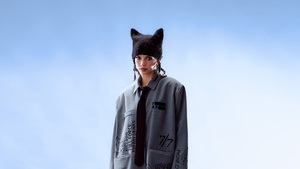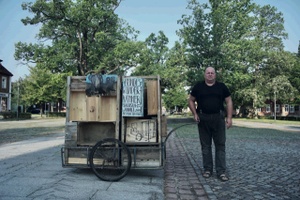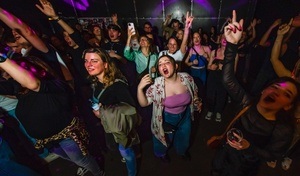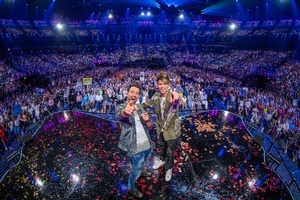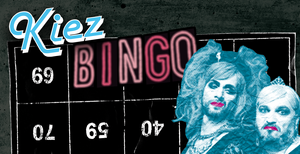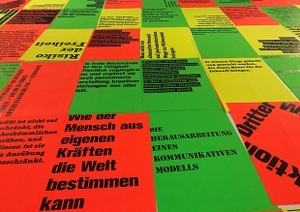UTOPIA. Keep on Moving New Forgotten Utopias | Lesungen, Performances, Musik
In the organizer's words:
Speculating, fabulating, building worlds - what strategies are used by artists and writers today to meet the challenges of societies and the planet? Are utopian concepts still possible in the face of complex realities and repressive political environments? Who defines utopias, their geographies and histories? Academy members and scholarship holders of the JUNGEN AKADEMIE lynn t musiol, Nazanin Noori with Andrea Belfi, Katharina Schultens and Sophie Seita question forgotten and new utopian narratives, figures, maps and social concepts. In newly developed performances and concerts as well as readings of as yet unpublished novel and poetry fragments, the artists reflect on and test the potential of utopias and their failure, of political art and poetry and of queer futures beyond a "cruel optimism" (Lauren Berlant). With musical interventions by Steloolive.
lynn t musiol - Love Porn!
"You must believe in something", sings Frank Ocean on Nostalgia, Ultra, his debut album from 2011. Many years later, we ask ourselves: Do faith and sensuality change in times of crisis? How do we desire when we encounter hellscapes outside of our screens? And how do we deal with ecological intimacies when nature begins to lose its familiar face? These are the questions lynn t musiol explores in her upcoming utopian novel Love Porn! (AT), which deals with the connection between the climate crisis and intimacies in the years after 2050. Here, dey takes a look into queer pasts in order to imagine the future forms of contemporary life. Like lynn t musiol's theater work BUCCI x ꒰(・ ‿ ・)꒱, the novel is part of a search movement that explores the materialities, structures and surfaces of queer forms and reassembles them in the sense of the practice of denormalization.
Sophie Seita - These Devices Became Law
These Devices Became Law is a new performance and textile work by Sophie Seita that responds to two historical utopias: Thomas More's Utopia and Madeleine de Scudéry's Clélie - in particular to the maps depicting the visions of the two authors*. She deals with the flaws and distortions of these utopias and links her "wanderlust" with the here and now of material reality. She also refers to the queer performance theorist Jose Muñoz, who defines utopia as "non-prescriptive; [...] a horizon of possibility, without a fixed scheme", but also as "a stage". In doing so, the work questions and imagines deconstructed geographies, violent maps, tender maps, queer maps, unpredictable maps, indecipherable maps - the gauze that covers the wound. The work is part of a larger project on queer performance formats using artistic research, experimental drawing, social practice and somatic workshops, developed in dialog with Creative Darlington, Darlington Library, Curious Arts and the Academy of Arts.
Katharina Schultens - imprecations of various former utopias and the provisional construction of another, which should also be cursed with the last breath
The revised and shortened version of a previously unpublished longer poetry project is initially based on a key poem by Bertolt Brecht from the late 1920s, 700 Intellectuals Worship an Oil Tank, in order to deal with the utopian idea of art as a medium of political discourse or social change. Representations of the so-called "critical intellectual" are examined, as they could be observed in the German post-war period up until the 1990s. This construct has been increasingly distorted in recent decades, particularly in the context of contemporary social media discourse and against the notion of free and equal conversation established in the 1990s in the utopian space of the internet, which was once even seen as a potential stabilizing factor for democracies. Other poems contrast current versions of this construct and the toxicity of ongoing social media discourses with the politically colorful figure of the Russian poet Marina Tsvetaeva, who hanged herself in 1941 after the regime under Stalin sentenced her husband to death and imprisoned her daughter. Finally, an attempt is made to imagine a utopian place of discourse and to ask: How would a space be conditioned that would allow us to really talk to each other? How can we approach those crucial points where it hurts - without hurting each other in the long term?
Steloolive
The sound interventions of the artist Steloolive are based on his personal archive of voices, sounds and noises from Accra (Ghana) and the world, which contains new and forgotten utopias. He combines electronic music and unconventional elements and rethinks the possibilities of sound. For New Forgotten Utopias, he combines the archive with live recordings of the participating artists, responding to their utopian state of mind and developing it further into a dynamic space.
Nazanin Noori with Andrea Belfi - THANK YOU FOR HAVING PENETRATED THE ESSENCE OF THIS WORK SO DEEPLY, WHICH I HOLD MOST DEAR. A reworking of Shostakovich's String Quartet No. 15.
The Russian composer Dmitri Shostakovich lived under the repressive regime of the Soviet Union. Much of his music was banned, many of his family members, friends and colleagues were imprisoned and executed after he was classified as an enemy of the people by Stalin in 1936. The communist utopia was unmasked in his music. In his works, he musically expressed his rejection of and resistance to censorship and control by hiding anti-regime messages in them. The propaganda music he was forced to compose was written in a way that reduced the nationalist spirit to absurdity. When he turned to the form of the string quartet in 1938, he wanted to do away with the hierarchical structures of the orchestra and compose in a way in which he was less under observation and could work more openly. The String Quartet No. 15 is the composer's last. It was premiered in 1974, one year before his death. Percussionist Andrea Belfi and modular synthesist and vocalist Nazanin Noori have reworked the piece under the titleTHANK YOU FOR HAVING PENETRATED THE ESSENCE OF THIS WORK SO DEEPLY, WHICH I HOLD MOST DEAR. by deconstructing and reinterpreting the original themes with tonal and atonal rhythms, electronic textures and vocal overlays in homage to the original. The performance reflects on the possibilities of art as an emotional documentation of times and history(ies), the fatal effects of utopian ideas in the context of authoritarian regimes and the complexity of artistic resistance.
In German and English
This content has been machine translated.Price information:
Day ticket (in combination with Concrete Utopias) € 12/8
Terms and Conditions for lotteries

